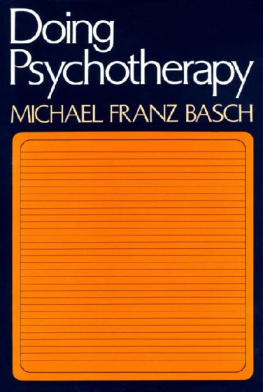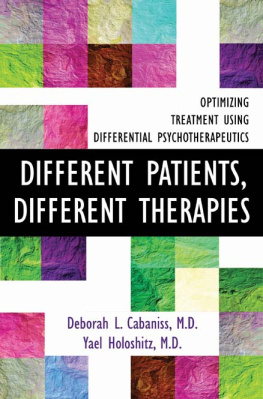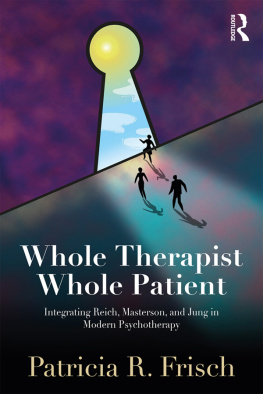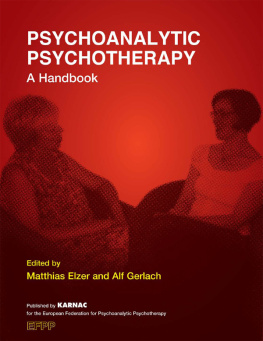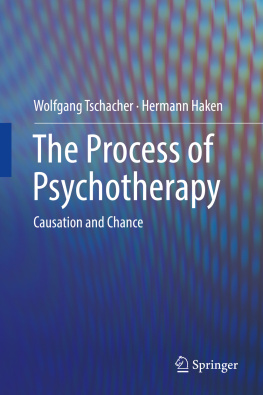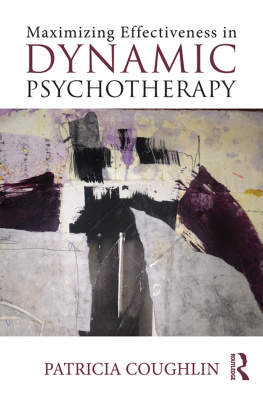



Michael Franz Basch




To
Carol
and to
Gail, Tom, and John

The task of the therapist. Psychotherapy as communication. The therapist's emotions. The therapist as a blank screen. The therapist as an active participant. Influencing the patient.Meeting the patient. Further remarks about anonymity. Social amenities and their importance. Office arrangements. Criteria for initiating psychotherapy.Three types of disturbance dealt with in psychotherapy. Establishing the diagnosis of psychoneurosis. The nature of the oedipal phase. Symptom neurosis and character neurosis defined. Psychoanalysis or psychotherapy?

This book, representing the culmination of my twenty-five years as a student, practitioner, and teacher of psychotherapy, owes much to many: to teachers who were more than kind; to colleagues who befriended me; to students who stimulated me; and, above all, to the patients whose trust, cooperation, and effort in the treatment situation gave me the opportunity to grow as a therapist. I gratefully acknowledge my debt and, albeit collectively, thank them all sincerely.
I was fortunate indeed to have the advice of Daniel Offer, M.D., while my manuscript was still in its early stages. His comments and suggestions helped me greatly in formulating its subsequent revision.
My friends Arnold Goldberg, M.D., and Constance Goldberg, M.S.W., were good enough to read each chapter as it took form. Their help and encouragement sustained me during the months that elapsed between the conception and the completion of Doing Psychotherapy. To say that I am most appreciative of the interest they showed does not do justice to my feelings, but I must let it suffice.
The thoughtful suggestions of George H. Klumpner, M.D., and Ruth Westheimer, M.D., proved to be most worth-while. Two others, Virginia C. Saft, M.D., and Charles M. Jaffe, M.D., gave me the benefit of their respective comments. I asked for a critique of the manuscript, never imagining that each of them would devote to that task the time and effort required to give me, literally, a line-by-line evaluation of my work. With the help of the eyes of these colleagues I was able to gain some distance from what I had written; as a result this is a better book than it would otherwise have been. I am both grateful for and touched by their efforts on my behalf.
Many thanks to Mrs. Eva Sandberg who stood by me uncomplainingly, typing and retyping the manuscript as often as I changed it. Knowing that I could count on her skill made my task much less tedious and difficult.
I want to thank my wife and my children who committed themselves to the idea of this book and to what its writing entailed. Their interest, understanding, and encouragement was and will remain vital for me.
I am grateful to the Theresa Benedek Research Fund of the Chicago Institute for Psychoanalysis for its generous assistance, and I also wish to express my appreciation to the Center for Psychosocial Studies for courtesies shown me during the preparation of this book.
M. F. BASCH
September 1979

Students of psychiatry, psychology, and social work often wonder, Does talking really help? In this book I answer that question in the affirmative by clarifying how and why psychotherapy works. My goal is to provide newcomers to the field, irrespective of their background, with a practical guide to individual, insight-oriented therapy. Many textbooks of general psychiatry teach the art of conducting a mental status examination, establishing a differential diagnosis, and managing the acutely disturbed and/or hospitalized patient. This book focuses on the treatment of a different group of emotionally troubled individuals.
My concern is with people whose problems are not clarified by an exploration of symptoms and overt behavior in keeping with the Kraepelinian method of psychiatric evaluation, and who generally do not respond to treatment based on a biologically oriented medical model. These patients function satisfactorily, perhaps even successfully, when judged by superficial standards, but their personal relationships are usually troubled, unsatisfying, and frequently destructive. Despite the fact that they often show significant potential, their creativity, their originality, and their capacity for meaningful achievement are frustrated by their pathology. At the root of their difficulties are long-standing patterns of perception and behavior which interfere with the successful conduct and enjoyment of their lives. Often severely anxious and depressed, these distressed and unhappy people require treatment in depth to resolve their difficulties. I have found that an active, goal-oriented, dynamic approach based on an understanding of the transference relationship between patient and therapist has an excellent chance of succeeding in these cases and can be taught readily to students.
Far from wanting to found one more school of psychotherapy and set it up in opposition to others, I wish to transcend factionalism and describe an approach that, though based on psychoanalytic principles, is not rigidly bound by any one method or philosophy of treatment.
Frequently psychotherapy is taught in the context of a theoretical framework with the expectation that students will adapt it to the needs of individual patients. In my experience this has proved frustrating for all concerned. Students, understandably anxious about their ability to function as therapists, want something more immediate and directly applicable. It is in the context of participating vicariously in the work of a more experienced therapist that they can acquire the principles they need and the theoretical background that they must master to become professionals. Using detailed, extensive, chronologically arranged excerpts from clinical material, I depict typical situations the psychotherapist is likely to meet. These examples are then used to derive the principles of technique and the underlying theory of development which form the basis for therapeutic intervention. By illustrating what actually happens in the course of treatment, making no effort to cover up the difficulties encountered by the therapist or the limits on the results obtained, I try to show what really goes on in psychotherapy, rather than to present an unrealistic version of what should or would happen if we were perfect and our patients all ideal. It is my hope that this approach will help the therapist build up reasonable expectations for him- or herself and for the patients being treated while learning suitable techniques with which to attain these ends.
Next page
